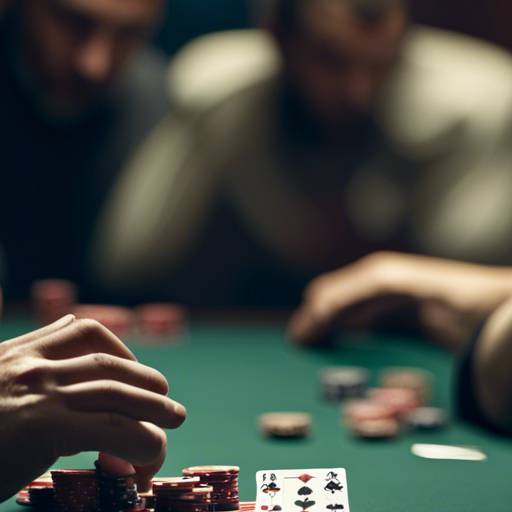2-Person Poker Card Games, often referred to as Heads-Up Poker, provide a unique and intense form of the classic card game tailored for intimate duels between two players. Unlike traditional poker games that involve a larger table of competitors, heads-up poker focuses on the direct confrontation between two individuals, making it a test of skill, strategy, and psychological warfare. This guide will delve into the nuances of 2-Person Poker, exploring the adjustments players must make in their approach to the game, the variations of poker suitable for two players, and the strategies that can lead to success in these high-stakes, one-on-one battles. Whether you’re a seasoned poker veteran or a newcomer to the game, understanding the dynamics of 2-Person Poker is essential for anyone looking to excel in this competitive format.
Mastering the Art of 2-Person Poker Card Games: Strategies and Tips

2-Person Poker Card Games: A Guide for Intimate Poker Duels
When it comes to the thrill of poker, the number of players at the table can drastically change the dynamics of the game. While traditional poker games often feature a bustling table of competitors, there’s a unique charm to the intimate duels that unfold in 2-person poker card games, also known as heads-up poker. In these close encounters, the game becomes not just about the luck of the draw but a true test of strategy, psychology, and skill.
Engaging in a heads-up poker game requires a shift in tactics from the multi-player version. Here, each hand holds greater significance, and the pace of play accelerates. The key to mastering this format lies in understanding the nuances of the game and adapting your strategy accordingly. One must be aggressive yet discerning, applying pressure while remaining vigilant against the opponent’s counter-moves.
Aggression is paramount in 2-person poker. With only two players, the probability of having a strong hand decreases, which means you can’t wait around for premium hands. Instead, you should be willing to bet and raise with a wider range of starting hands. This assertive approach will force your opponent to make difficult decisions and can lead to them folding more often, allowing you to accumulate chips even with mediocre hands.
However, unbridled aggression can be your downfall if not tempered with strategic thinking. It’s crucial to pick your spots and recognize when your opponent is playing back at you. Pay close attention to their betting patterns and adjust your play accordingly. If they’re calling your raises frequently, it might be time to tighten up and wait for stronger hands. Conversely, if they’re folding too often, you can exploit this by continuing to apply pressure.
Another critical aspect of 2-person poker is the psychological battle. In this intimate setting, you have the opportunity to develop a read on your opponent’s tendencies and tells. Use this information to your advantage by identifying patterns in their behavior. Are they bluffing more often than not? Do they become passive when holding a strong hand? Understanding these subtleties can give you the upper hand and allow you to outmaneuver your opponent.
Position also plays a vital role in heads-up poker. Being in the dealer position, or ‘on the button,’ gives you the advantage of acting last post-flop. This allows you to see how your opponent reacts before you make your move, providing valuable insight into the strength of their hand. Make sure to capitalize on this positional advantage by playing more hands when you’re on the button and being more selective when you’re out of position.
Finally, adaptability is the hallmark of a great 2-person poker player. No two opponents are the same, and as such, your strategy should be fluid, changing to match the ebb and flow of the game. Be prepared to switch gears if your current approach isn’t working. Sometimes, a change in tactics can throw your opponent off balance and give you the edge you need to secure victory.
In conclusion, 2-person poker card games offer a thrilling and challenging experience that tests your poker acumen in ways that traditional games cannot. By embracing aggression, honing your observational skills, leveraging your position, and remaining adaptable, you can master the art of intimate poker duels. Remember, in the world of heads-up poker, it’s not just about the cards you’re dealt—it’s about how you play them against your sole adversary across the table.
The Ultimate Guide to 2-Person Poker Card Games: Rules and Variations

When it comes to the thrill of poker, many might envision a crowded table where players vie for dominance amidst a sea of poker faces. However, the essence of poker – the strategy, the bluffing, the excitement – can be distilled into a more intimate setting with just two players. Welcome to the world of 2-person poker card games, where the duel is personal, and the gameplay is just as intense.
Imagine sitting across from your opponent, the table between you a battleground of wits and probability. In this setting, every move is magnified, every tell more telling, and every hand a critical juncture in the quest for victory. This is the allure of heads-up poker, a format that offers a pure form of the game where you can truly get into the mind of your opponent.
The beauty of 2-person poker lies in its simplicity and the ease with which it can be adapted from traditional multi-player poker games. One of the most popular variations for two players is Texas Hold’em. The rules remain largely the same, but the dynamics shift dramatically. With only two players, the probability of winning hands increases, and the action is faster-paced. Each player is dealt two private cards, and as the community cards are revealed, the intensity of the game escalates with each betting round.
Moreover, the strategy in a heads-up game is markedly different. Aggression tends to be rewarded more than in a full ring game. Players must be willing to play a wider range of hands, and the ability to read your opponent becomes paramount. The psychological aspect of the game is heightened, as you must constantly adapt to the changing tendencies of your sole adversary.
Another engaging 2-person game is Omaha, which can also be easily tailored for two. Each player receives four private cards and must make the best hand using exactly two of them, plus three of the five community cards. This variation introduces more complexity and potential hand combinations, making it a challenging and exciting option for poker enthusiasts looking for a twist on the traditional game.
For those seeking a quicker, more casual experience, the classic game of Five-Card Draw is perfect for two players. It’s straightforward: each player is dealt five cards, there’s a round of betting, and then the opportunity to exchange some of your cards for new ones from the deck. The simplicity of Five-Card Draw makes it an excellent choice for a friendly yet competitive poker duel.
Regardless of the variation you choose, playing poker with just two people requires a blend of skill, intuition, and adaptability. It’s a test of mental endurance and a chance to develop a deeper understanding of the game’s mechanics. The reduced number of players doesn’t diminish the game’s complexity; rather, it amplifies the importance of each decision.
In conclusion, 2-person poker card games offer a unique and engaging way to experience the beloved game of poker. Whether you’re a seasoned player looking to sharpen your skills or a casual enthusiast seeking a new challenge, the world of intimate poker duels awaits. So, grab a deck, find a worthy opponent, and prepare to embark on a journey of strategic depth and personal rivalry that only heads-up poker can provide. Remember, in the realm of 2-person poker, every hand is a battle, and every game is a story waiting to unfold.
Enhancing Your 2-Person Poker Card Games: Essential Skills for Intimate Duels

When it comes to the world of poker, the image that often comes to mind is a crowded table, with players donning sunglasses and unreadable expressions. However, poker doesn’t always require a large group to be engaging. In fact, two-person poker card games, also known as heads-up poker, can be just as thrilling, if not more so. This intimate duel requires a unique set of skills and strategies that differ significantly from full-table games. To enhance your two-person poker experience, let’s delve into the essential skills you need to master for these intimate duels.
First and foremost, aggression is key in heads-up poker. With only two players, the probability of having a strong hand decreases, which means you can’t wait around for premium hands. Being aggressive allows you to take control of the game and put constant pressure on your opponent. This doesn’t mean you should be reckless; rather, it’s about being selectively aggressive, knowing when to push your advantage and when to back off.
Adaptability is another crucial skill in this poker format. Unlike in a full-table game where you can stick to a more consistent strategy, heads-up play requires you to constantly adjust your approach based on your opponent’s behavior. You must be able to read their patterns, identify their weaknesses, and change your tactics accordingly. This dynamic nature of the game makes it essential to stay alert and flexible.
Hand reading becomes even more important in a two-person game. With fewer players, you have more opportunities to observe your opponent’s betting patterns and make educated guesses about their holdings. Pay close attention to how they bet on different streets, their reaction to your moves, and any physical tells they might inadvertently give away. This information is invaluable and can help you make better decisions throughout the duel.
Psychological warfare is an integral part of any poker game, but in a heads-up match, it’s amplified. The mental battle between two players can be intense, and having a strong psychological game can give you a significant edge. It’s about staying calm under pressure, managing your emotions, and not letting your opponent get into your head. Projecting confidence, even when bluffing, can lead to your opponent making mistakes.
Lastly, endurance is often overlooked but is essential in heads-up poker. These games can last for an extended period, and maintaining focus throughout is crucial. Fatigue can lead to poor decision-making, so it’s important to be in good mental and physical shape. Regular breaks, staying hydrated, and keeping your energy levels up can all contribute to a sustained performance.
In conclusion, two-person poker card games offer a unique and intense experience that tests a different set of skills than those required at a full poker table. By honing your aggression, adaptability, hand reading abilities, psychological strength, and endurance, you can become a formidable opponent in these intimate duels. Remember, the beauty of heads-up poker lies in the constant back-and-forth, the subtle adjustments, and the psychological depth. So, embrace the challenge, refine your skills, and you may find that these one-on-one battles are not just a test of your poker abilities, but also a thrilling way to connect and compete with your fellow poker enthusiast.
2-Person Poker Card Games: Bluffing and Psychology in One-on-One Challenges

When it comes to the world of poker, the image that often comes to mind is a table surrounded by players, each with a stack of chips and a pair of cards, ready to bluff their way to victory. However, there’s a more intimate side to this classic card game that’s just as thrilling and psychologically intense: two-person poker card games. These one-on-one challenges strip down the game to its core elements, where bluffing and psychology aren’t just part of the game; they are the game.
Imagine sitting across from your opponent, the table between you no longer a crowded arena, but an intimate stage for a duel of wits. In this setting, every move and every glance carries weight. The beauty of two-person poker lies in its simplicity and the heightened sense of tension that comes with it. With fewer cards in play, the ability to read your opponent becomes paramount. You’re not just playing the cards; you’re playing the person holding them.
In these duels, the art of bluffing reaches new heights. Without the camouflage provided by multiple players, your bluffs must be more calculated, more convincing. It’s a delicate dance of deception, where one misstep can reveal your intentions. But when executed perfectly, a well-timed bluff can be even more satisfying than in a traditional game, as you’ve outwitted your opponent in the purest form of poker.
Moreover, the psychological aspect of two-person poker cannot be overstated. The game becomes a battle of endurance and mental fortitude. You must maintain focus, control your emotions, and be adept at interpreting subtle cues. Every raised eyebrow or twitch of the hand could be a tell, a window into your opponent’s mind. It’s a test of how well you can conceal your own tells while deciphering those of your adversary.
The strategies employed in two-person poker also differ from those in larger games. With fewer variables to consider, the game is more about adaptation and reaction. You must be quick to adjust your tactics based on the ever-changing dynamics of the game. It’s a constant back-and-forth, a chess match where each player is trying to stay one move ahead.
For those who relish the psychological aspect of poker, two-person games offer a pure and concentrated form of the experience. It’s not just about having the better hand; it’s about convincing your opponent you do, even when you don’t. It’s about reading their strategy and countering it with your own. This intimate format of poker is a true test of skill, nerve, and psychological insight.
In conclusion, two-person poker card games are a fascinating variation of the traditional poker experience. They offer a unique opportunity to delve into the psychological warfare that lies at the heart of poker. Whether you’re a seasoned player looking for a new challenge or a newcomer eager to sharpen your skills, these intimate poker duels are an excellent way to explore the deeper strategic elements of the game. So, gather your cards, sit down with a worthy opponent, and prepare for a battle of wits that will test your bluffing prowess and psychological acumen to the fullest.
Two-person poker card games, often referred to as heads-up poker, offer a unique and intense form of the classic card game tailored for intimate duels between players. These games require a different strategic approach compared to multi-player poker, emphasizing psychological warfare, aggressive play, and the ability to read the opponent. Mastery of heads-up poker involves a deep understanding of hand values, positional play, and adaptation to the opponent’s tendencies. The intimate nature of the game allows for a more personal and direct confrontation, making it a thrilling and skill-intensive variation of poker that is enjoyed by both casual players and professionals alike.
















+ There are no comments
Add yours